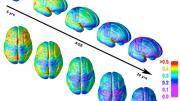"Computer use does not cause carpal tunnel syndrome.” Moreover, “no one has proven that the disease is made worse by work on a computer,” says Barry P. Simmons, M.D., associate professor of orthopedic surgery at Harvard Medical School and chief of the hand/upper extremity service at Brigham and Women’s Hospital. Good news for computer makers, bad news for lawyers.
The carpal tunnel at the base of the palm is composed of a U-shaped cluster of eight bones with a ligament arching over them as a roof. The median nerve runs through the tunnel on its way from the spinal cord to the hand. If the tunnel narrows for any reason, the resulting pinch or entrapment of the nerve decreases its blood supply, causing carpal tunnel syndrome. The symptoms are pain, weakness, and tingling in the thumb, index finger, middle finger, and half of the ring finger.
If you’re a 50-year-old woman who has worked for 20 years at a computer and you develop carpal tunnel syndrome, you may naturally suppose that the computer gave you that pain in the hand. When lawyers ask Simmons to review a case of carpal tunnel syndrome in a client who works at a computer, “I say, ‘I’ll review whatever case you like, but I want to let you know ahead of time that I don’t think carpal tunnel syndrome is work related.’ They say, ‘Well, let me think about it.’”
This exculpation of computers, defying widely held belief, is spelled out for a lay audience in a new “special health” report from Harvard Medical School entitled Hands: Strategies for Strong, Pain-free Hands, edited by Simmons (www.health.harvard.edu). “Carpal tunnel syndrome is sometimes described or classified as a repetitive stress injury, but that’s incorrect,” according to the report. “A study of more than 5,600 Danish workers, published in the Journal of the American Medical Association in 2003, found that workplace computer use does not pose a risk for developing carpal tunnel syndrome. And a 2001 study in Neurology of computer users at a medical facility found that heavy computer use (up to seven hours a day) did not increase a person’s risk of developing carpal tunnel syndrome.” (“Industry sources and organized labor disagree on the findings” of the Danish study, reported Inside OSHA, a newsletter covering the Occupational Safety and Health Administration.)
The disease is more common in people who do fairly forceful assembly-line work. But about two-thirds of people whose carpal tunnel syndrome was presumed to be occupational in origin have been shown to have other medical conditions capable of causing the disease, Hands reports. These include metabolic diseases such as diabetes and thyroid disease; autoimmune diseases such as rheumatoid arthritis, lupus, and connective-tissue disorders; previous bone fractures; pregnancy; and obesity. Genes deserve the blame for about half the incidence of carpal tunnel syndrome. Aging increases one’s risk and so does gender; 70 to 80 percent of those afflicted, says Simmons, are women. Carpal tunnel syndrome leads to surgery in about a third of cases.
Tickling the keyboard and squeezing the mouse can bring on painful hand and wrist troublewhat Simmons calls overuse syndrome“but for me,” he continues, “the pure overuse syndrome, or ‘mouse finger,’ as the Danish study calls it, is a nonsurgical disease.” If you have an aching or buzzing mouse hand, or diffuse pain radiating into your forearm, Hands advises, you should get an ergonomic evaluation of your workplace to make sure that your computer, your keyboard, your mouse, and you are correctly positioned. At least once an hour, get up from your chair and stretch. Go to the window and admire spring.
~Christopher Reed
Barry Simmons e-mail address: bsimmons@partners.org





